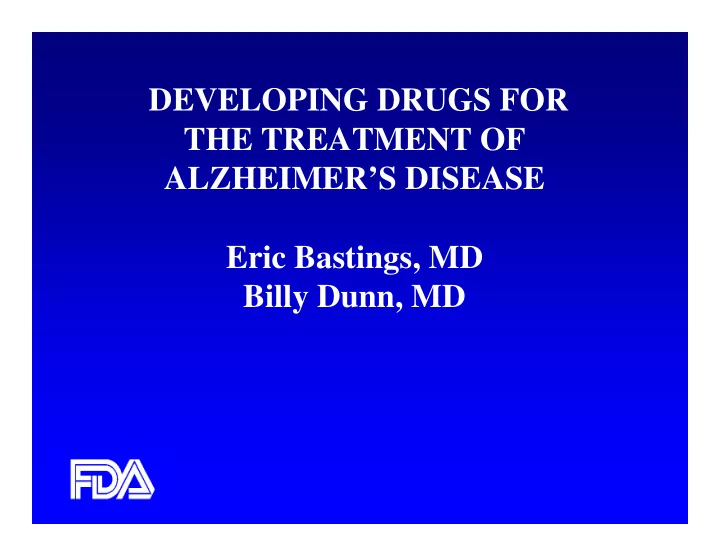

DEVELOPING DRUGS FOR THE TREATMENT OF ALZHEIMER’S DISEASE Eric Bastings, MD Billy Dunn, MD
Disclaimer Views expressed in this presentation are those of the speaker and not necessarily those of the Food and Drug Administration
Outline • Dementia stage Alzheimer’s disease • Early stage Alzheimer’s disease (AD) – Early AD approaching onset of dementia • Prodromal AD or MCI due to AD – Very early AD • Preclinical AD
DEMENTIA STAGE ALZHEIMER’S DISEASE
Dementia Stage Alzheimer’s Disease • All drugs approved so far have been for patients at the dementia stage – Donepezil approved for all stages of AD – Galantamine and rivastigmine approved for mild to moderate AD – Memantine approved for moderate to severe AD 5
Dementia Stage Alzheimer’s Disease • Co-primary efficacy endpoints: cognitive measure and global or functional co-primary – Cognitive endpoint: ADAS-cog, Severe Impairment Battery (SIB) – Functional or Global measure: CIBIC-plus, ADCS-CGIC • These endpoints do not represent “gold standards” – Other endpoints could be considered 6
ALZHEIMER’S DISEASE EARLY STAGE
Early Stage Alzheimer’s Disease • Area of considerable interest to FDA – Goal of intervening before major neuronal damage sets in is critically important – Effective disease-modifying interventions will likely have their most permanent impact before brain damage is too extensive 8
FDA Draft Guidance on Early AD (2013) • Selection of patients with early AD closest to the onset of overt dementia (i.e., prodromal AD or MCI due to AD) • Selection of patients who are determined to be at risk of developing AD (preclinical AD) • Selection of endpoints for clinical trials in these populations 9
EARLY AD APPROACHING THE ONSET OF OVERT DEMENTIA
Primary Endpoint in Early Stage AD (approaching onset of dementia) • Mild functional or global impairment difficult to detect before onset of overt dementia • Assessment tools to assess global or functional impairment not suitable for that stage of the disease • Composite scale assessing both cognition and function may be acceptable – Should not allow for overall finding of efficacy in the absence of functional benefit 11
Identifying the Right Patient Population • Important to adequately enrich the patient population, both to keep drug risk acceptable and have trials of reasonable size and duration – CSF biomarkers – Amyloid imaging biomarkers 12
What Biomarkers Should Be Used to Select Patients? • No FDA-endorsed set of diagnostic/inclusion criteria • Variations in the selection of biomarkers and/or cognitive testing cutoff values may lead to the identification of patients who are at different stages of a progressive disease process 13
TRIALS IN PATIENTS WITH VERY EARLY ALZHEIMER’S DISEASE (PRECLINICAL)
Very Early AD • Underlying anatomical and pathophysiologic changes in AD begin many years before clinical symptoms emerge • Only subtle cognitive deficits at that stage • Difficult to identify patients with very early AD • Difficult to establish meaningfulness of drug effect 15
Very Early AD • Primary endpoint: valid and reliable sensitive measure of cognitive performance – Possibility of Accelerated Approval pathway • Following initial approval, requirement for demonstration that the observed effect translates into functional benefit (in new adequate and well- controlled studies or continuation of initial studies) 16
Recommend
More recommend